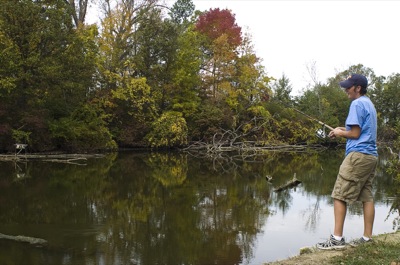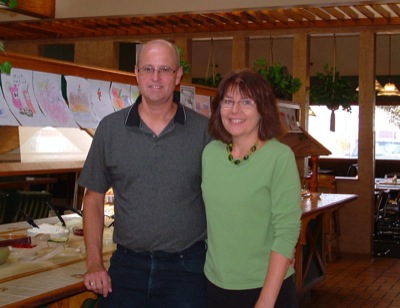Wednesday, October 13th, 2010
Group explores setup change
Legal status may net more money
By Nancy Allen

Photo by Mark Pummell/The Daily Standard
Kelly Hathaway of Celina fishes behind the Mercer County Sportsman Club on Monday afternoon. After some unseasonably warm weather the last few days, fall weather returns later this week. Local weather forecaster Dennis Howick predicts temperatures in the 60s beginning Thursday.
GRAND LAKE - The Lake Restoration Commission (LRC) may change its makeup, but the group's goal of a cleaner Grand Lake will remain the same.
Exploratory discussions are under way to decide if the LRC, which has raised about $550,000 for technology and scientific consultation to help restore the lake, should become a legally-organized entity. This would give the group more opportunities for government funding.
Formed in late January, the LRC is a volunteer coalition of individuals from government entities and private organizations from Mercer and Auglaize counties. Its members represent economic development, watershed, farming, tourism and state park interests. It was formed to address the toxic blue-green algae blooms that nearly shut down the 13,500-acre lake this summer.
"Currently, we are an ad hoc, all-volunteer group," said Jared Ebbing, Mercer County's economic development director and a LRC member. "We feel we have hit the next phase in development and it is more than worthwhile to start looking into something more official and how we take that next step."
The LRC is functional, but has limitations because it is not a legally organized group, Ebbing said. If it becomes one, it would be able to lobby the state for the region's needs and apply for possible incentives and grants that could help the two-county area.
Milt Miller, the LRC's fundraising chairman, noted the LRC "doesn't exist legally on paper." Its grant funding had to be submitted through township and county offices.
Ebbing and commissioners from Auglaize and Mercer counties recently discussed hiring a firm or attorney to research and help determine the best organizational structure. No decision has been made on where the funds to pay for legal help would come.
"We need to engage with a firm who can help us, perhaps an attorney or legal view," he said. "We need some help on what's best suited for this region."
He said the group would not be a conservancy or a port authority, but perhaps a hybrid that would use some of the same structure of both but be unique to the watershed.
Legally organizing the entity likely would take more than a few months. It also would need approval from the state legislature because exists no prototype.
"Whatever this district is called, we would like it to include a layer that would encourage investment and entrepreneurial groups to come in and test not only ecological equipment, but also equipment that could help the agribusiness community and do it some good," Ebbing said.
The lake's toxic blue-green algae is fed by excess nutrients that run off mostly farmland, the largest land-use in the 59,000-acre watershed. Phosphorous, found in manure and commercial fertilizers, contributes most to algae blooms.
The thick, foul-smelling algae led the state to place a no contact with the water advisory on the lake this summer. The advisory was downgraded to allow boating after toxin levels dropped dramatically in the last several weeks.
Ebbing said the LRC is proceeding carefully and doesn't want to create a new group if it is unnecessary. If a new group is created, the LRC would disband, he said. From the start, the LRC was meant to be a starting point for something more permanent and organized, he noted.
"At the end of the day, the positives have to outweigh the negatives, and it has to be done for the right reasons and benefit the region as a whole without creating an unnecessary layer," Ebbing said.
Mercer County Commissioner Jerry Laffin and Auglaize County Commissioner John Bergman said commissioners want discussions to continue so an informed decision can be made.
"Until we can find some legal mind who can help us put some of this stuff together, I can't say what we're going to end up with," Laffin said. "But I think we need to explore it."
Auglaize County Commissioner Doug Spencer agreed, adding that both counties' commissioners will meet Thursday in Wapakoneta with a representative from the Columbus law firm of Vorys, Sater, Seymour and Pease to gather information.
"I can't say county commissioners will ultimately delve into making this happen, but we want to hear how this may work and how an entity might be created to help the region and lake," Spencer said.
Public meeting about Grand Lake:
What: Public meeting to update efforts to restore Grand Lake
Where: Wright State University-Lake Campus' James F. Dicke hall
When: Oct. 20; 6:30 p.m. doors open, technology displays; main presentation is 7-9.
Details: Those attending can view displays explaining technology and research being used to restore the lake. Consulting firms and organizations associated with the technology will be on hand to answer questions.
A master plan for the lake will be reviewed. Strategies and funds being pursued locally to restore the health and economic vitality of the region also will be discussed.
Grand Lake Restoration Commission (LRC) officials will discuss the possibility of changing the LRC into an official, legally organized entity.




